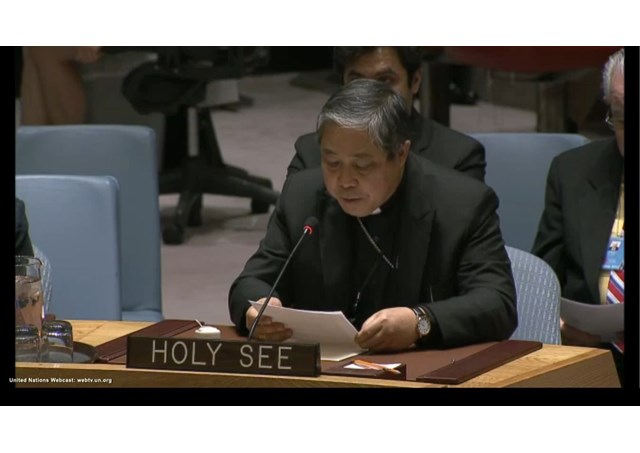
Abp Auza to UN panel: man-made crises drive migration

(Vatican Radio) The Apostolic Nuncio and Permanent Observer to the United Nations in New York, Archbishop Bernardito Auza, has released his prepared remarks to the second of two panel discussions of issues surrounding sustainable development and poverty eradication, in connection with the Global Compact on safe, orderly and regular migration. Please find the full text of Archbishop Auza's prepared remarks, below
********************************************************************
Intervention of H.E. Archbishop Bernardito Auza Apostolic Nuncio and Permanent Observer of the Holy See to the United Nations Global Compact on safe, orderly and regular migration:
Informal Thematic Session on Addressing drivers of migration, including adverse effects of climate change, natural disasters and human made crisis, through protection and assistance, sustainable development, poverty eradication, conflict prevention and resolution
Panel 2: Human-made crises as drivers of Migration
United Nations, New York, 22 May 2017
Distinguished Ambassadors and Panelists,
In paragraph 43 of the New York Declaration, the International Community committed itself to addressing “the drivers that create or exacerbate large movements” in order to “cooperate to create conditions that allow communities and individuals to live in peace and prosperity in their homelands.”
In this regard, the Holy See continues to insist on the right of all to remain in their countries in peace and economic security. If conditions for a decent life are met and the drivers of migration are adequately addressed, people would not feel forced to leave their homes.
My Delegation thus urges that the Global Compact underline the right to remain as prior to the right to emigrate. This does not mean that one right is more important than the other, but that by ensuring this prior right, migration flows will become voluntary, regular and safe, and consequently more manageable and sustainable. When the right to remain is respected, migration becomes a choice rather than something forced or involuntary. For this right to become effective, however, the factors that constrain people to emigrate must be attended to through international cooperation founded in mutual trust, responsibility and solidarity.
There is no worse human-made crisis that drives people forcibly to migrate or internally displaces populations than wars and violent conflicts. More than half of the world’s refugees, forced migrants and internally displaced persons have been forced to abandon their homes and properties and, indeed, to flee their countries, because of conflicts and violence, the tremendous negative impact of which continues in the odyssey of the victims. They face the dangers of trafficking in persons, starvation and many forms of abuse. Upon arriving at their destination, rather than finding a safe haven, in many places they find mistrust, suspicion, discrimination, extreme nationalism, racism and a lack of clear policies regulating their 2 acceptance. Clearly, the most effective way to stop massive movements of forced migrants and refugees is to stop the wars and violent conflicts that cause them.
Moreover, factors such as extreme poverty, the lack of basic goods and services, and severe environmental degradation and disasters are also major drivers of migration. Helping distressed populations where they are, rather than procrastinating and hoping for the best, is the most effective way to prevent their becoming involuntary migrants. It could also be the most cost effective way to help them and to spare them from all forms of exploitations. When vulnerable individuals and populations are forced to move, human rights abuses and sexualrelated violence against women and children become all too common; families are separated; many are forcefully detained upon arrival or fall victim to human trafficking and other forms of modern slavery. While in transit and especially upon arrival in countries of destination, forced migrants are often perceived as taking advantage of host communities, rather than hapless peoples who deserve assistance and human sympathy.
My Delegation would like to emphasize that the tremendous cultural, social and economic loss that is now being suffered in many countries of origin due to human-made crises and other drivers of migration makes the adoption of a Global Compact for migration even more pressing. The migrants who are massively crossing international borders, the forced migrants in search of safety and protection, and the many millions more internally displaced persons look to us for hope and action. The most comprehensive and cooperative way to assist them would be through a strong, effective Global Compact on Migration.
I thank you.
| All the contents on this site are copyrighted ©. |


